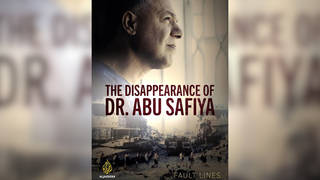
Guests
- Arlie Russell Hochschildsociologist and author of the 2016 book Strangers in Their Own Land: Anger and Mourning on the American Right.
As Donald Trump selected Ohio Senator JD Vance to be his vice-presidential candidate Monday, we look at the record of the 39-year-old political rookie, who rose to fame after writing the memoir Hillbilly Elegy and who once compared Trump to Hitler and called him unfit for the presidency. He was elected to the Senate in 2022 with backing from right-wing billionaire Peter Thiel, and he has since embraced the MAGA movement and become one of Trump’s most loyal supporters. For more on Vance’s rise and his appeal to the Republican base, we go to Pikeville, Kentucky, to speak with famed sociologist Arlie Russell Hochschild, who has been speaking with Trump supporters for her forthcoming book, Stolen Pride: Loss, Shame, and the Rise of the Right, which is a follow-up to her 2016 book, Strangers in Their Own Land: Anger and Mourning on the American Right, described as “a Rosetta stone” for understanding the rise of Donald Trump.
Transcript
AMY GOODMAN: This is Democracy Now!, democracynow.org, The War and Peace Report. I’m Amy Goodman.
“America’s Hitler,” “reprehensible,” “cultural heroin,” “noxious,” “a terrible candidate.” That’s how Ohio Senator JD Vance once described Donald Trump. But on Monday, Trump tapped the 39-year-old to be his running mate, capping an extraordinary rise for Vance, who was just elected to the Senate in 2022.
J.D. Vance first gained fame as the author of the best-selling memoir Hillbilly Elegy: A Memoir of a Family and Culture in Crisis about growing up in Appalachia. The book was also made into a movie. Vance is a graduate of Yale Law School who served in the Marines and became a venture capitalist. He won a close Republican Senate primary in 2022 in part thanks to billionaire tech investor Peter Thiel, who spent a record-breaking $10 million to support Vance’s campaign.
After years of criticizing Trump, Vance shifted his views to embrace the MAGA movement. In a major profile, political reporter Ian Ward describes this shift by writing, quote, “Vance has completed a dramatic evolution from outspoken Never Trumper to unwavering Trump loyalist and dogged defender of the ex-president’s most authoritarian assertions — from the lie that the 2020 election was stolen to the legally dubious claim the president is immune from criminal prosecution,” unquote.
On Monday, President Biden criticized Vance as a, quote, “clone of Trump on the issues.”
We begin today’s show hearing JD Vance in his own words describing Donald Trump. In 2016, he appeared on NPR’s Fresh Air.
J.D. VANCE: I’m going to vote third party, because I can’t stomach Trump. I think that he’s noxious and is leading the white working class to a very dark place.
AMY GOODMAN: In another 2016 media appearance, J.D. Vance spoke to MSNBC about sexual abuse allegations against Donald Trump.
J.D. VANCE: Well, this is sort of a he said/she said, right? And at the end of the day, do you believe Donald Trump, who always tells the truth? Just kidding. Or do you believe that woman on that tape?
AMY GOODMAN: To talk more about JD Vance, we’re joined now from Pikeville, Kentucky, by Arlie Russell Hochschild, sociologist and author. Her forthcoming book is titled Stolen Pride: Loss, Shame, and the Rise of the Right. It’s a follow-up to her 2016 best-seller, Strangers in Their Own Land: Anger and Mourning on the American Right. The book was a finalist for the National Book Award and has been described as “a Rosetta Stone” for understanding the rise of Donald Trump.
Arlie Hochschild, thanks so much for being with us. If you can start off by just responding to the news yesterday that Donald Trump had chosen JD Vance to be his vice-presidential running mate? You have been on a panel when both your books were out, Hillbilly Elegy and Strangers in Their Own Land. Talk about the rise of JD Vance, what he means, and what President Trump means.
ARLIE RUSSELL HOCHSCHILD: You know, thank you, Amy, for the invitation.
You know, I’m here in Pikeville, that is a 40-minute drive to Jackson, Kentucky, where Vance spent his summers, mainly with his Mamaw, who really brought him up when his mother succumbed to drugs. So, there’s that story, personal story, that I think Trump picked him to represent.
But for me, the real question is — you know, there’s a saying, which is, “Without wood, there would be no fire,” from Proverbs. And so, what’s the support for Vance, the support? Why do 40% of Americans think this is the way to go? I think what we need to do is to back up and look at the larger story of red state/blue state differences.
I think here in Pikeville and in this area — and this area is the whitest and second-poorest congressional district in the country. It’s Kentucky 5. And it used to be at the center politically, and in the ’90s, you know, two-thirds of this area were Blue Dog Democrats. But they voted 80% for Trump in the last two elections.
So, what’s happened to Vance as a person sort of happened to this region, and not just this region. It used to be on the left, and it’s gone right. And so, what’s the wood that’s leading the fire? What’s the reason for this? I think that’s what my book is about, and that’s what I think we who are alarmed at this trend need to look at.
AMY GOODMAN: Talk about your work and what you found over these years. We last spoke in 2016. You had spent five years with some of Donald Trump’s biggest supporters researching your book. And talk about how things have changed, from leading into the first presidency of Donald Trump to what’s happening today, and also, Arlie Russell Hochschild, how people have responded to the horror of the assassination attempt on Trump on Saturday in Pennsylvania.
ARLIE RUSSELL HOCHSCHILD: Well, the people that I’m talking to here, it only consolidates their sympathy for Trump and their determination to support him. And that’s because they see him as a supporter of them.
So, to answer your question, what makes this current book, Stolen Pride, kind of different from my previous book, Strangers in Their Own Land, is that I’m focusing actually on this issue of democracy, what people feel about it and why do they feel so strongly. And, you know, there’s a regional story, and that’s that coal jobs are out. They have blamed the liberal war on coal for that loss. Opiate addiction has come in big time and hasn’t stopped. In this region, mainly poor whites are the victims of it. And these are in underregulated states, I should say — Kentucky and Tennessee and West Virginia — who let these opiates come in, and they’ve done untold damage. So these are people who have just felt down, just a sense of terrible loss, freefall loss. And now many are leaving the region, the young, the most educated. And so, this becomes an area of loss. And I think it speaks to a lot of the red states. And they don’t feel the government has offered answers with dignity to them for this loss.
So, in a way, I see what’s — Vance’s story is kind of a regional story. And I think the regional story kind of speaks to a larger story. In a way, we’re used to thinking of countries like Mexico and the Philippines or Kerala, India, as kind of sending people out to richer countries. So, there’s the metropole that has many jobs and is kind of rich, and there are poor states that migrate to them. Well, there’s a domestic version of that. Kentucky is the Mexico of the domestic system like that. It’s sending its young and its educated out, and that’s tremendous loss for them. And once a person from Kentucky goes to San Francisco or New York, they feel labeled as a hillbilly. One guy told me that even going to Lexington, just hours away, but it’s a city, when they hear your accent, oh, and you’re in a store and looking at things, they begin to follow you around, because they think you don’t have the money to buy what you want to buy. So, there’s a kind of a label and a shame.
And that’s the next story I would tell, that it’s not just this logic of economic haves and have-nots. There’s an emotional logic that goes along with it, of shame and pride. Here in Kentucky, here in Appalachia, very proud people, very gifted people, but who have suffered this big loss. They’re shaming themselves, especially after addiction kind of breaks up many families, does irreparable harm. They shame themselves. And then they feel like people in the blue states are just slinging epithets at them. They feel shamed.
And I think Donald Trump comes in as the shame president. He comes in with an anti-shaming ritual that relieves them of this. And I think that’s a lot of the steam behind the MAGA enthusiasts for the Republican ticket.
AMY GOODMAN: Arlie, I want to go to the trailer of the Netflix film Hillbilly Elegy, based on J.D. Vance’s best-seller Hillbilly Elegy: A Memoir of a Family and Culture in Crisis about growing up in Appalachia.
MAMAW: [played by Glenn Close] I thought your mama was going to be all right, be happy. I know I could have done better. But you, you’ve got to decide: You want to be somebody or not?
BEV: [played by Amy Adams] I’ve been doing real good. I just had a down month.
J.D. VANCE: [played by Gabriel Basso] I got an interview tomorrow, Mom. Otherwise, I’d be —
BEV: Oh, you know me. I always land on my feet.
MAMAW: J.D., don’t look at her. Come on. Come on. Don’t you look at — you look at me. You look at me.
YOUNG J.D. VANCE: [played by Owen Asztalos] You let her get away with this every time.
BEV: I told you that I would do better.
YOUNG J.D. VANCE: You always say that! You’re lying!
BEV: And I always try.
MAMAW: You’ve got to think about these kids.
BEV: What do you think I’ve been thinking about since I was 18 years old, huh? Never had a life where I wasn’t thinking about the kids.
J.D. VANCE: Do you actually want to be dead, Mom? Or are you just too lazy to try?
BEV: Oh, I tried. Plenty.
MAMAW: You’ve always got a reason. It’s always someone else’s fault. Some point, you’re going to have to take responsibility, or someone else is —
BEV: Or what?
MAMAW: — going to have to step in.
BEV: Who? Huh? Who? You?
MAMAW: Hasta la vista, baby.
YOUNG J.D. VANCE: How many times have you seen this?
MAMAW: Oh, about a hundred. Everyone in this world is one of three kinds: good terminator, a bad terminator and neutral.
YOUNG J.D. VANCE: You’re a good terminator.
MAMAW: I wasn’t always. I had to learn. You could, too.
BEV: I love you. I promise that I’m going to do better.
MAMAW: J.D., you’ve got a right to your own life.
LINDSAY: [played by Haley Bennett] Don’t make us your excuse, J.D.
MAMAW: Family is the only thing that means a goddamn. You’ll learn that.
AMY GOODMAN: So, that’s the trailer for the film Hillbilly Elegy, which is based on J.D. Vance’s book, Hillbilly Elegy. I’m wondering, Arlie Russell Hochschild, if you can talk about the significance of this book. Your book came out about the same time. It’s how you came to know JD Vance, again, who then became senator from Ohio and is now the youngest vice-presidential candidate at the age of 39. Talk about Hillbilly Elegy.
ARLIE RUSSELL HOCHSCHILD: You know, I think it’s a brilliant film. By the way, Amy Adams, Glenn Close, I think brilliant acting, and a very poignant story. It got panned by a lot of critics. But I think it tells a real story, a story I have heard here, up close and personal. And kind of the disruption of addiction and the chaos it creates, the anxieties, the sense of shame, that you are bad, and all of that, I think, is very real. And it’s a good depiction of it.
What this celebrates, of course, what’s lifted out by the Republican Party, is the Horatio Alger rise. You know, personal determination, hard work will lift you from these circumstances for something better. And it doesn’t look at what else we have to change so that a lot of people have a chance at that. So, it’s kind of both very poignant, but it’s been politically used to pluck out a quite individualist-oriented theme, and it says nothing about, really, why people get into the fix they’ve been in, which is what my book is about.
AMY GOODMAN: And, Arlie Russell Hochschild, the fact that JD Vance has called President Trump “America’s Hitler,” talked about in the years past, back in 2016, really, his horror about what Donald Trump represented, saying he goes after the people he, JD Vance, loves, like immigrants, talking about Muslims. What about this complete turnaround?
ARLIE RUSSELL HOCHSCHILD: Yeah, and it is paradoxical that people in these — like, in Kentucky and elsewhere, that are in fact the migrants to economic powerhouse centers, are trying to bar other immigrants, you know, from Mexico or South America, from coming in, because they’ve actually, in the domestic world, experienced the immigrant experience, you know? And so, that’s the paradox.
But I think what — and I don’t know what little switch turned in JD Vance’s mind to turn him from anti-Trump to pro-Trump. It’s easy to say it’s self-interest. But I do think that there’s something that progressives aren’t seeing, that is told by a story I learned.
There was a — in a recovery center, there was a man who had — was a coal miner. He got injured. He went to the doctor, was given OxyContin for pain management. He got addicted to OxyContin, and that led to other drugs. He became an addict. He lost his family. His wife left him. He lost custody of his children. He became homeless. And that man watched Donald Trump come to Kentucky, and Donald Trump was pumping his fist and saying, “I’m going to bring back coal. I’m going to bring back coal.” And that man said, “I knew Trump was lying. He wasn’t going to bring back coal. But I felt he saw who I was.”
AMY GOODMAN: I wanted to play for you Teamsters President Sean O’Brien, Arlie, who gave the final speech. And this was extremely significant, for the president of this major union to be speaking at the Republican National Convention. He spoke last night, on the first night.
SEAN O’BRIEN: Never forget, American workers own this nation. We are not renters. We are not tenants. But the corporate elite treat us like squatters, and that is a crime. We’ve got to fix it.
Now, this will shock you. This will shock you. To paraphrase Senator Markwayne Mullin, it’s time for both sides of Congress to stand their butts up. We need trade policies that put American workers first. It needs to be easier for companies to remain in America. We need legal protections that make it safer for workers to get a contract. We must stop corporations from abandoning local communities to inflate their bottom line. We need meaningful bankruptcy reform. Today, corporate vultures buy up companies like Yellow Freight with the intent of driving them into bankruptcy and feasting on their remains. The courts leave workers begging for crumbs as third-tier creditors.
Labor law must be reformed. Americans vote for a union but can never get a union contract. Companies fire workers who try to join unions, and hide behind toothless laws that are meant to protect working people but are manipulated to benefit corporations. This is economic terrorism at its best. An individual cannot withstand such an assault. A fired worker cannot afford corporate delays, and these greedy employers know it. There are no consequences for the company, only the worker.
We need corporate welfare reform. Under our current system, massive companies, like Amazon, Uber, Lyft and Walmart, take zero responsibilities for the workers they employ. These companies offer no real health insurance, no retirement benefits, no paid leave, relying on underfunded public assistance. And who foots the bill? The individual taxpayer. The biggest recipients of welfare in this country are corporations, and this is real corruption. We must put workers first.
AMY GOODMAN: So, that’s Teamsters President Sean O’Brien addressing not the Democratic convention, known as the party of labor, but the Republican convention, the first time a Teamsters president has addressed the RNC, as he talks about economic terrorism and corporate predators. As we wrap up, Arlie Russell Hochschild, if you could comment on this? And also, his wife, Usha Vance — they met at Yale Law School — she clerked for both Chief Justice Roberts and Justice Kavanaugh.
ARLIE RUSSELL HOCHSCHILD: Yeah. So, listening to Sean O’Brien’s talk, it makes you wonder why those words aren’t coming out of the mouth of Joe Biden and why the Build Back Better and the infrastructure bills, that are really helping red states more than blue, aren’t paired with a kind of empathic, powerful message to the very people that O’Brien is addressing. So, there’s a giant kind of disconnect between what I think the left liberal side believes, what it — who it wants to help, and the message. The message. So, we have a lot of work to do in the short number of weeks we have left before this election, and it has to be to straighten that out and to reach out to those who need to know that there’s an alternative to Donald Trump.
AMY GOODMAN: Arlie Russell Hochschild, sociologist and writer, author of the 2016 best-seller, Strangers in Their Own Land: Anger and Mourning on the American Right, her forthcoming book, Stolen Pride: Loss, Shame, and the Rise of the Right, speaking to us from Pikeville, Kentucky.
Coming up, we will speak with the Pulitzer Prize-winning journalist David Cay Johnston about the Trump-appointed Judge Aileen Cannon’s shocking decision to dismiss the classified documents case against Donald Trump. And then we’ll hear from protesters in the streets here in Milwaukee at the Republican National Convention. Back in 20 seconds.












Media Options